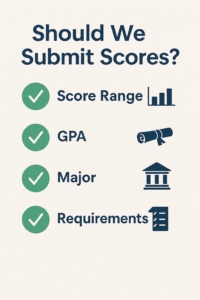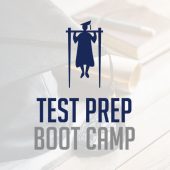Should You Submit SAT/ACT Scores?
In today’s ever-changing world of college admissions, one of the biggest questions facing families is this: If my teen has an SAT or ACT score, should we submit it—or hold back?
Welcome to the era of test-optional policies. These policies are now the norm at many colleges and universities across the country, but they can raise more questions than they answer. If you’re a parent of a high school student with a decent score—but not a dream score—you might be wondering how to guide your child through this part of the admissions process.
Let’s break it down together—with clarity, confidence, and an expert perspective designed just for families like yours.
What Does “Test-Optional” Really Mean?
A test-optional policy gives students the choice to submit standardized test scores—or not—as part of their college application. Many colleges made this change in response to the disruptions of the pandemic, but even now, a majority continue to support test-optional admissions. And they’re not just small liberal arts colleges—top public universities and some Ivy League schools are on board.
Here’s the catch: test-optional doesn’t mean test-blind. Colleges that are test-optional will absolutely look at scores if submitted, and some schools may still require scores for specific programs, merit scholarships, or honors colleges. That’s why reading the fine print on each school’s admissions page matters.
Should You Submit Your Child’s Scores?
This decision deserves careful thought—not just a gut feeling. Here are four practical factors to consider:
1. Compare Scores to College Ranges
If your child’s SAT or ACT scores fall above or within the school’s middle 50% range, submitting them might give a helpful boost. You can usually find these score ranges on the school’s admissions website or through resources like Common Data Sets.
score ranges on the school’s admissions website or through resources like Common Data Sets.
Search tip: Look up “[College name] middle 50% SAT ACT scores” for instant benchmarks. Or use College Navigator to get an idea of a schools “middle 50%.”
2. Weigh Academic and Extracurricular Strength
A stellar GPA, honors courses, and a deep record of extracurricular involvement can stand alone without test scores. If your child’s transcript and resume tell a compelling story, their application is already in great shape.
3. Consider the Major
STEM programs often place more emphasis on math or quantitative reasoning. A solid math score might carry more weight there. In contrast, humanities or arts programs may prioritize essays, portfolios, and grades.
4. Check for Special Requirements
Even at test-optional schools, some scholarships or honors tracks may still ask for scores. Make a checklist to be sure.
 Going Test-Optional: What Else Matters?
Going Test-Optional: What Else Matters?
If your student decides not to submit scores, don’t worry—they’re far from alone. What matters most is maximizing the rest of the application to show their true potential.
✍️ Personal Essays with a Pulse
An essay is more than just words—it’s their voice. Encourage your child to write an essay that reveals character, resilience, curiosity, or even vulnerability. This is where authenticity wins.
💬 Recommendations That Resonate
Great recommendation letters highlight not just academic achievement, but personality and work ethic. Teachers who know your child well—those who’ve seen them in action—are best positioned to write meaningful letters.
🎓 Coursework and Class Rigor
Colleges respect academic courage. A transcript that includes AP, IB, or honors courses reflects readiness for college-level challenges—often more so than a standardized test.
🧭 Meaningful Extracurriculars
Leadership roles, long-term volunteer work, entrepreneurship, creative projects—these tell a story of passion and purpose. Depth matters more than dabbling.
📁 Portfolios or Personal Projects
If your teen has built something—whether it’s a YouTube channel, nonprofit initiative, art portfolio, or app—these can serve as powerful application supplements.
Talking Through the Decision
This decision isn’t just tactical—it’s personal. Your teen might feel uncertain, frustrated, or even defeated by a score that doesn’t reflect their true potential. Reassure them that the admissions process now looks at the whole person, not just a number.
Sit down together. Review each school’s policy. Build a list of pros and cons. And ask, “Does submitting this score make our story stronger—or blur it?”
Final Takeaway: Be Strategic, Not Stressed
Test-optional policies aren’t loopholes—they’re invitations. They invite students to show colleges who they are beyond a bubble sheet. For some, that means

submitting strong scores. For others, it means letting other parts of their application shine.
Whichever path your family chooses, you can move forward with confidence. The goal isn’t to game the system—it’s to tell your student’s story in the clearest, most compelling way possible.
Take the First Step Toward College Success!
Planning for college can feel overwhelming, but you don’t have to do it alone. Schedule a free 30-45 minute introductory consultation with a college admissions expert to create a personalized roadmap for your student’s future.
📅 Book your consultation today: Click here







